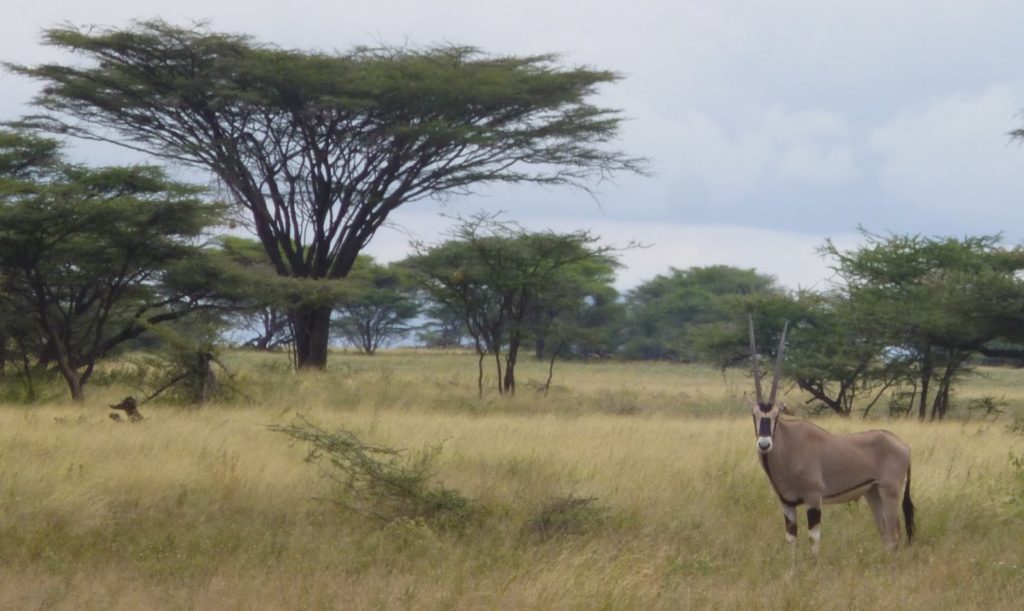By Dr Jemma Batten, Project Manager for Marlborough Downs Space for Nature
At the beginning of this year, I spent a couple of months working for the Mount Kenya Trust (MKT), a charity based – you’ve guessed it – on Mount Kenya. One of the things I was asked to look into was how the Trust can support local farmers by developing a ‘model’ shamba (farm/smallholding) for demonstration/trial purposes. To get started I visited lots of interesting projects and talked to many experienced farmers. It seemed that everywhere I looked there were great examples and training opportunities.

However, everyone I spoke to told me that demonstration farms don’t work. One local farmer who is pioneering sustainable agriculture was puzzled and frustrated that, although people from all over the world attend his six-day sustainable agriculture courses and day tours, his neighbours continue to farm in the same way they always have done. Demos have been tried, and they failed. Everyone tells me that the soil is exhausted, but no one takes advice, even when it’s free!
Having initially scratched my head about why this might be, it became obvious fairly quickly that Kenyan farmers are not so different from those I work with in the UK. It’s no good people like me, or NGOs or charities or even entrepreneurs from their own communities, trying to tell local farmers what they should be doing, but instead we need to let them decide for themselves what support they want, what they’d like to trial, and what training they need to help them farm more economically, more efficiently and more environmentally.
So I decided that the best way to approach this may be to try to establish farmer groups along the same lines as those I started in the UK, in the hope that groups would spring up across the mountain following an initial pilot project.
Proposal
It was agreed that, rather than designing and developing a model farm, the MKT team and I would try to initiate one or more farmer groups and ask what it is that they would like to trial on their own land, and what training and support they need to help them make the transition from subsistence to more sustainable farming. MKT has good relationships with several local communities, and we would start with two of these.
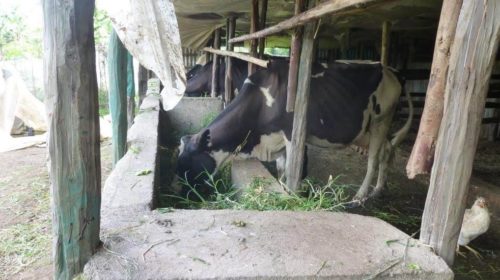
Each farmer group will be responsible for its own structure, governance, objectives and budget, with the proviso that all project activities and expenditure benefit the group as a whole rather than individual members. Each group will be supported by an individual MKT staff member, ideally one who has a pre-existing relationship with the farmers in that area. It may also be beneficial (though not a requirement) to identify a ‘lead’ farmer who is particularly interested in the programme and who will give impetus to the group.
Activities
With MKT staff, I identified an initial menu of potential group activities and costed out each one. Groups will also be encouraged to submit their own suggestions for things they would like to see demonstrated/trialled, and the training, information and advice they need. Priorities will then be selected by group members according to their available budget.
Training
One of the fundamental features of successful farmer-led groups is access to high-quality training. There are plenty of local people and organisations in the Mount Kenya area who would be happy to share their experiences, with the only cost being for transport to get farmers to the relevant sites.
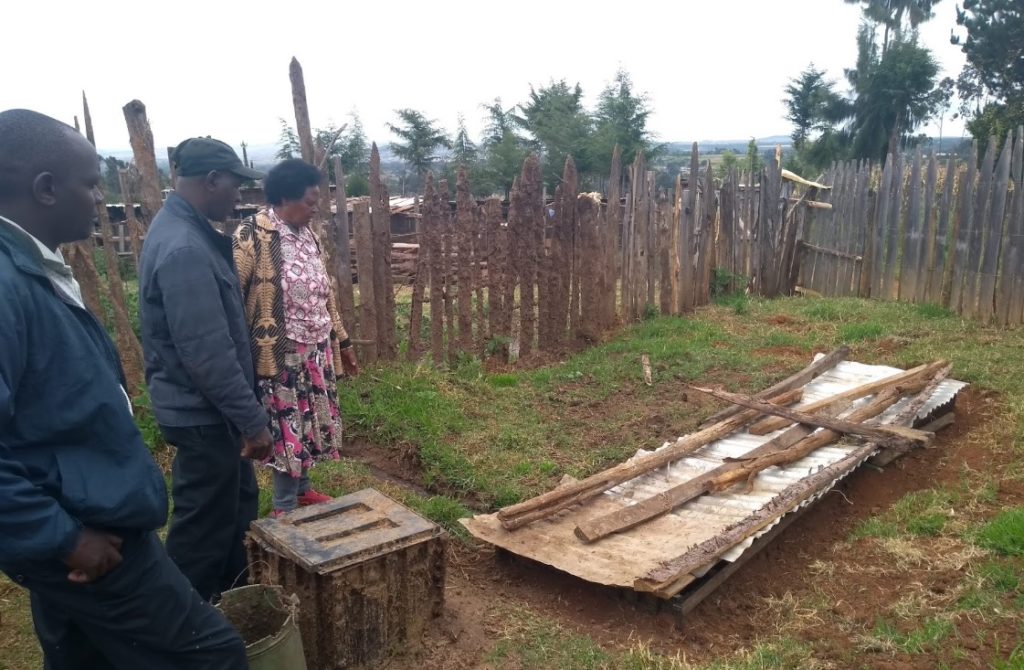
Examples of potential training events might include:
- Visits to Eco Fuels to learn about composting and how farmers might get involved (and make money) by supplying croton nuts via local agents, co-ordinated within the group.
- Eco Fuels also offered to set up a trial to demonstrate the benefits of croton vinegar as an organic fertiliser, to be located on land farmed by one of the group members.
- Cropnuts Farm Advisory Service offered to deliver workshops on soil health.
- PAFID (Participatory Approaches for Integrated Development) Kenya has a Conservation Agriculture site in Meru where they are practising minimum tillage, residue retention and crop rotation, and Mount Kenya farmer groups have been invited to visit.
- Mpala Research Centre is looking into efficient irrigation systems and would be willing to share results.
- There are also local training opportunities in:
- short, medium and long-term organic food production on smallholdings
- creating and maintaining sustainable kitchen/market gardens
- tree propagation
- agro-forestry
The MKT team and local farmers themselves are no doubt familiar with other examples of innovative or established good practice, which could also be invited to engage with the programme.
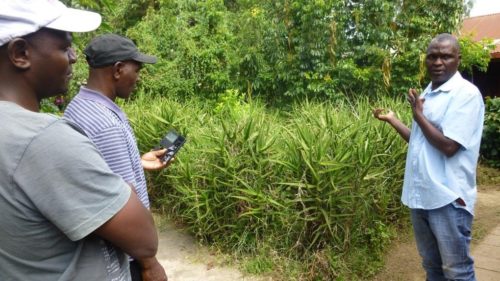
Further afield, Josphat Macharia’s Ndabibi Environmental Conservation Centre, a stone’s throw from Lake Naivasha, offers sustainable agriculture courses, and it would be great if some of the Mount Kenya farmers could be funded to attend these. Looking ahead, there may also be the opportunity to commission bespoke courses, which would enable more of the farmers to benefit and bring new skills to the mountain.
Progress
Although I had to leave Kenya in a rush at the end of March (COVID-19!), we had already had an initial meeting with the chief (think ‘mayor’) and farmers of one community, and had another in the pipeline. The farmers were keen to find out more about improving soil health, so that’s our starting point.
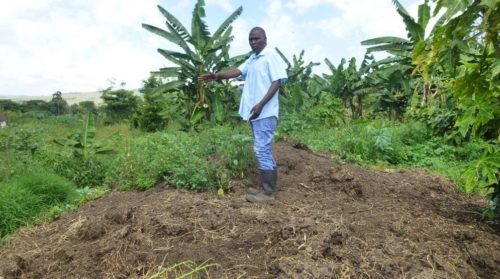
Funding
Before I went out to Kenya, I raised almost £2,500 in sponsorship for MKT, and it has been agreed that this can be used to fund the first two farmer-led groups. Many of my sponsors are themselves members of farmer groups here in the UK, so I thought it was very fitting to use the funds towards piloting something similar over in Kenya. We will start each group with a budget of £1,000, with the option of them applying for additional funding for specific activities on individual farms that will contribute towards group learning.
I also had initial conversations with two commercial farmers in the area who would potentially be interested in supporting groups made up of neighbouring smallholders. It may also be possible to get commercial packhouses to fund groups made up of their local suppliers.
I’m hoping that some of my UK farmer clients might be persuaded to fund specific elements or activities – a demonstration water harvesting unit, or a training event, for example – or maybe I can get UK farmer groups to ‘twin’ with Kenyan groups. If you’re interested in finding out more about the project or would like to donate, please do get in touch.
Contact Jemma: jemma.batten@blacksheepcountryside.co.uk
